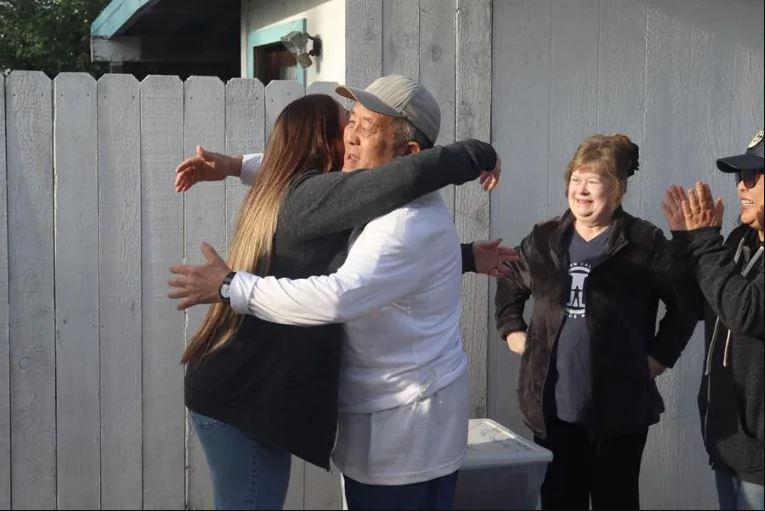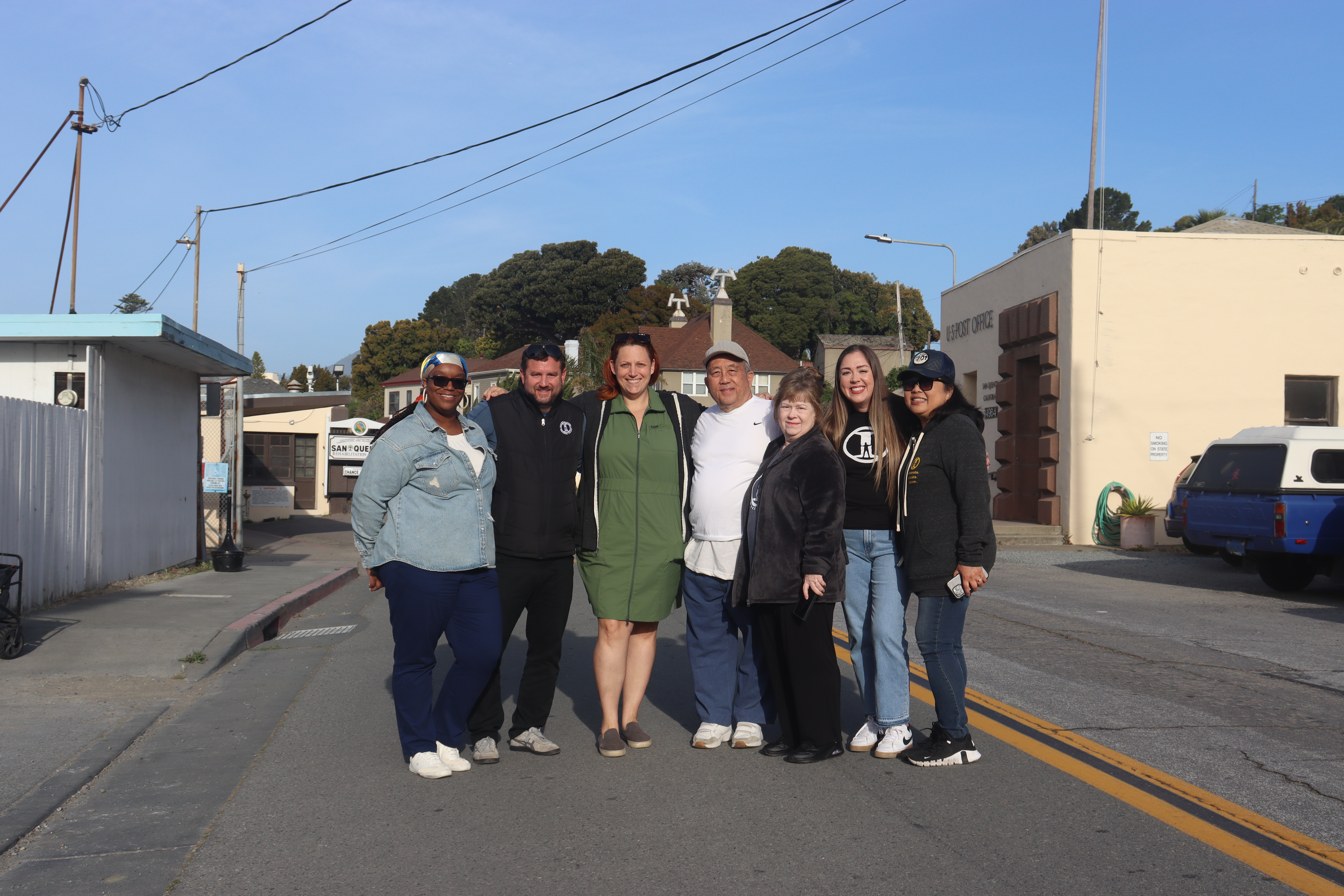
NCIP Client Reginald Tanubagijo Released from Prison After 11 Years of Wrongful Incarceration
Tanubagijo’s convictions were vacated based on unreliable science
SANTA CLARA, Calif., MAY 19, 2025 — Reginald “Regi” Tanubagijo, a 68-year-old Solano County man, was freed from San Quentin Rehabilitation Center on Friday, May 16 after his two convictions were reversed and vacated. Tanubagijo was represented by the Northern California Innocence Project (NCIP) at Santa Clara University School of Law.
Tanubagijo was wrongfully convicted on charges of second-degree murder and assault on a child causing great bodily injury or death, after the tragic accidental death of his infant foster son in 2010. Both convictions were reversed and vacated on May 7, 2025.
The charges stemmed from an accident in 2010, when the bouncer chair in which Tanubagijo’s foster child was seated slipped off the kitchen table, resulting in a fatal head injury.
Tanubagijo always maintained that the child’s death was an accident. Moreover, all lay witnesses at trial testified that he was a loving, gentle, father and foster parent, who adored his foster son and would never have harmed him.
However, at trial three experts gave medical testimony—which has since been proved faulty— that a short fall could not explain the infant’s injuries. They insisted the injuries could only be the result of shaken baby syndrome (SBS) or abusive head trauma (AHT).
Advances in Science Undermine Original Conviction
In subsequent years, medical literature has documented evidence that accidental falls of short distances can cause the same injuries once believed to be almost exclusively attributable to SBS/AHT.
In 2021, at the request of NCIP, the then-acting chief forensic pathologist for the Alameda County Sheriff-Coroner, where the autopsy was originally performed in 2010, reviewed the case and provided a declaration stating that since 2014: 1) the prosecution’s expert testimony on short falls has been undermined and 2) the medical and forensic community has since broadened its view of what could cause injuries previously attributed to SBS/AHT.
“The state of medical knowledge finally supports what Mr. Tanubagijo has long insisted: that his foster son’s tragic death was the result of a devastating accident,” said NCIP Clinical Supervising Attorney Lauryn Barbosa Findley. The Solano County District Attorney’s Office has the option to retry Tanubagijo, though Barbosa Findley says the case for retrial looks very different today with the new scientific findings. “Mr. Tanubagijo is unfortunately one of the many loving parents and caretakers who have been wrongfully convicted based upon what we now know is flawed science and unsupported dogma.”
Tanubagijo and his wife had significant experience caring for infants, having served as foster parents for seven children, one of whom they adopted. They received multiple awards from the county of Solano and the California State Assembly in recognition of their dedication to providing a nurturing and safe environment to infants in need. The couple helped raise their niece, who was 17 at the time of the trial and testified that her uncle was a wonderful caretaker who was never violent. Tanubagijo, who worked at the Solano County Probation Office for 12 years, had no history of violence or crime and had an impeccable reputation at work and in his community as a calm, gentle, and peaceful man.
Today’s legal victory comes after more than three years of fighting for Tanubagijo’s exoneration.
During that time, NCIP co-sponsored and helped to pass California Senate Bill 467, which established a path for the innocent to challenge their wrongful convictions when based on expert opinions that relied on:
- evidence that has since been undermined by the state of scientific knowledge or later scientific research
- evidence about which a significant scientific dispute has further emerged regarding its reliability or validity.
With this change in law, NCIP filed a writ of habeas corpus in the Court of Appeal in Tanubagijo’s case. The Court issued an Order to Show Cause, and sent the case back down to the Superior Court, which ordered an evidentiary hearing, resulting in both of Tanubagijo’s convictions being reversed and vacated. Ruling from the bench on May 7, 2025, Judge William J. Pendergast III stated that 1) there is new evidence that more likely than not would’ve changed the outcome of the case, 2) material evidence consisting of expert medical testimony introduced at trial has been rendered false because it has been undermined by the state of scientific knowledge, and 3) a significant dispute has emerged in Tanubagijo’s favor regarding expert medical testimony that was introduced at trial.
NCIP’s Broader Initiative to Correct SBS/AHT Wrongful Convictions
Tanugagijo’s case came to the attention of NCIP through a project begun six years ago to identify and litigate likely wrongful SBS/AHT convictions in California. NCIP identified hundreds of convictions and found that many of them bear the hallmarks of a wrongful conviction based on new scientific evidence.
“This marks the second consecutive case where NCIP has proactively identified and freed a wrongfully convicted person, rather than waiting for the client to reach out to us for assistance,” said NCIP Executive Director Todd Fries. Several months ago, NCIP helped to reverse the conviction of Jose Olivares, who served 13 years in prison based on an SBS misdiagnosis. “We hope that as courts in California and across the country take notice of these cases, it will help shift the paradigm in how SBS cases are evaluated by prosecutors, by doctors, and by the legal system as a whole.”
Funding for NCIP’s extensive work in SBS/AHT research and litigation was provided as part of the U.S. Department of Justice’s Upholding Rule of Law and Preventing Wrongful Convictions Program, in addition to funding from an Equal Justice Works Fellowship sponsored by Fenwick & West, LLP.
About the Northern California Innocence Project (NCIP)
NCIP is a non-profit clinical program of Santa Clara University School of Law whose mission is to promote a fair, effective, and compassionate criminal justice system and protect the rights of the innocent. Since its inception in 2001, NCIP has processed over ten thousand requests for inmate assistance, investigated hundreds of cases, pursued litigation or collaborative resolution in dozens, and obtained the freedom of 38 wrongfully convicted people. Learn more at www.ncip.org.
Media Contact
Carla Spain | NCIP External Relations | cspain@scu.edu | (510) 725-1572
